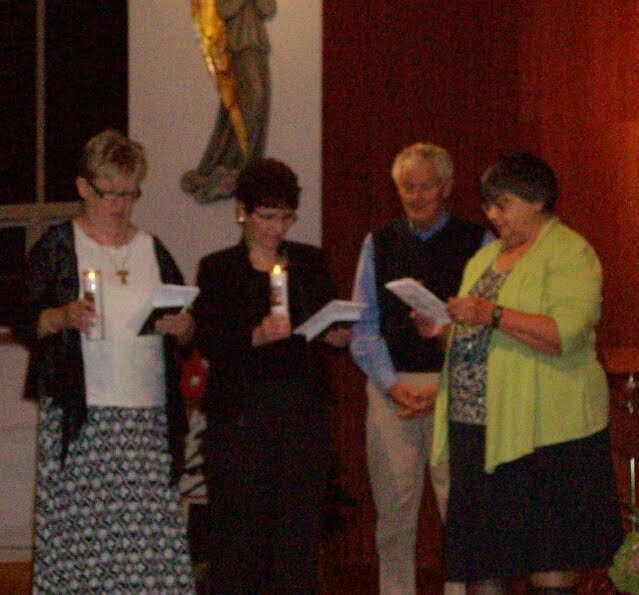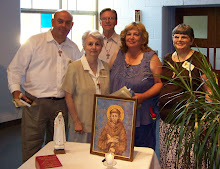Saturday, February 9, 2013
Live as if the whole world were a cloister
This approach to ministry is one that places relationship and community above one’s personal faith journey and conversion. In fact, one’s own conversion, if indicative of a Franciscan hue, should lead toward humanity and away from only one’s self. It is for precisely this reason that Francis insisted that the friars were to remain mendicants and not monks, to live as if the whole world were a cloister and not be limited to the four walls of private religious life.
~Francis of Assisi and the Future of Faith by Daniel Horan OFM
Pax et bonum
The Genius of the Incarnation
The
Genius of the Incarnation
Marty
Lynch OFS
I found this recent article from ZENIT
relevant to me as a Franciscan, because in it the Holy Father offers the
faithful yet another insight into the genius that is imbedded within the
mystery of the Incarnation, a mystery so central to our saintly founder’s major
charism. So I’m offering this little
piece that would be useful for our own catechesis and contemplation. May it
bring you – as it has me -- to a prayer of gratitude to our merciful Lord who
has provided us with yet another brilliant and pastoral Vicar of his holy
presence on earth, the successor of John Paul the Great. Makes you want to shout, “Alleluia!”
What the prophets of the Old Testament
longed for, and what even atheists today long for, is made possible by Jesus
Christ, says Benedict XVI: We can see God's face.
This
was the reflection the Pope offered Wednesday in the general audience, as he
considered the revelation of God made with the Incarnation.
The
Holy Father explained that Jesus' answer to the Apostle Philip, who requested
to see the Father, is a synthesis of the Christmas event…Jesus' answer…leads us
into the heart of the Christological faith of the Church; the Lord affirms:
'Whoever has seen me has seen the Father.'
This
is a synthesis of the novelty of the
New Testament, according to the Pontiff. God can be seen, he has shown his
face, he is visible in Jesus Christ.
The
theme of seeking God's face runs throughout the Old Testament, Benedict XVI
added, with 400 uses of the Hebrew term for face, 100 of which refer to the
face of God.
Still,
Judaism, in forbidding the use of all images -- and thus standing in opposition
to the worship of idols -- seems to totally exclude from worship and piety any
possibility of seeing, the Pope observed.
What
does it mean then, for the pious Israelite, to seek the face of God, while
recognizing that there can be no image of Him … on the one hand, it is said
that God cannot be reduced to an object, to a simple image, nor can anything be
put in the place of God; on the other, however, it is affirmed that He has a
face, that is, He is a 'You' that can enter into a relationship, who isn't
closed in his Heavens looking down upon humanity.
God is certainly above all things, but he turns
to us, hears us, sees and speaks, makes covenants, is capable of love. The
history of salvation is history of God with humanity, it is the history of this
relationship of God who progressively reveals himself to man, letting him see
His face.
In
fact, the Pope continued, The splendor of the divine face is the source of
life, it is what allows us to see reality, and the light of His countenance is
the guide to life.
God's
progressive revelation culminates in Christ … God's affirm(s) to Moses…no one
shall see me and live, (yet) something new happens with the Incarnation. The search for the face of God undergoes an
unthinkable change, because now this face can be seen: that of Jesus,… In Him
the path of God's revelation finds fulfillment, which began with the call of
Abraham;… in Him the content of Revelation and the Revealer coincide.
The Holy Father affirmed that a desire to know
God truly, to see the face of God is in every man, even atheists. This desire is fulfilled in following Christ…
in the whole of our lives, not only when we are in need or find a spare moment.
The
whole of life should be directed towards encountering Him, towards loving Him;
and, in… the light of the Crucified One… to recognize the face of Jesus in the
poor, the weak, the suffering, Pope Benedict said. This is only possible if the true face of
Jesus has become familiar to us in… entering into his Word in such a way as to
really encounter him, and naturally in the Mystery of the Eucharist.
The
Eucharist, the Pope said, is the great school in which we learn to see the face
of God, we enter into an intimate relationship with Him, and we learn at the
same time to turn our gaze towards the final moment of history, when He will
satisfy us with the light of his face.
ZENIT,
The world seen from Rome News Agency
Pax et bonum
God's Romantic Love
The Greatest Valentine of All:
Br. Joseph Michael Fino, CFR, Most
Blessed Sacrament Friary, Newark, NJ
Love is a word that is
bigger than mere romance. And yet there
is something in romantic love that more keenly captures the heart. Paternal or maternal love, filial or
fraternal, even spousal love—which cannot always be romantic—are more enduring
kinds of love. They are loves that walk
us through life, foundational and structural loves, highly important in
practice and reception.
We know that God loves
us paternally, like a father. Jesus is our friend and brother, and so we
experience his steadfast support and presence. Even the Holy Spirit loves us,
encouraging and inspiring us over the long haul.
But do you ever
encounter God’s romantic love? If not, I
have to say, it’s important that you do. Romantic love is quicker, more sudden, shorter
lasting but more impacting. It is the
love that pierces the heart and captures the imagination. This encounter is behind all those
overbearing converts that won’t stop talking about Jesus and the Church and the
Eucharist, and they won’t stop because they simply cannot, because they’ve
fallen in love, and when we do that, we want everyone to fall with us!...
The
scriptures give us no shortage of evidence that God will pursue us, that he
will court us, and the word seduce us is even used. Christmas is the story of a
lover decidedly throwing himself into the life his beloved. God puts himself in
a position of radical closeness to the one he loves and begins to woo, to
seduce by his presence, by his words and his life. He now touches us, speaks closely to us and
desires to take us unto himself so that we may live together forever.
He is anxious to love
you romantically, to surprise you and win you; you have only to let him do it. If you have not yet experienced this side of
him, I would say, ask for it, expect it, and don’t be afraid when it actually
happens. For then you will learn two
very important truths: Jesus is real and alive, and he loves you personally,
whoever and wherever you are, and he loves you a lot. And if you allow it, this will change your
life.
Pax et bonum
Subscribe to:
Posts (Atom)


